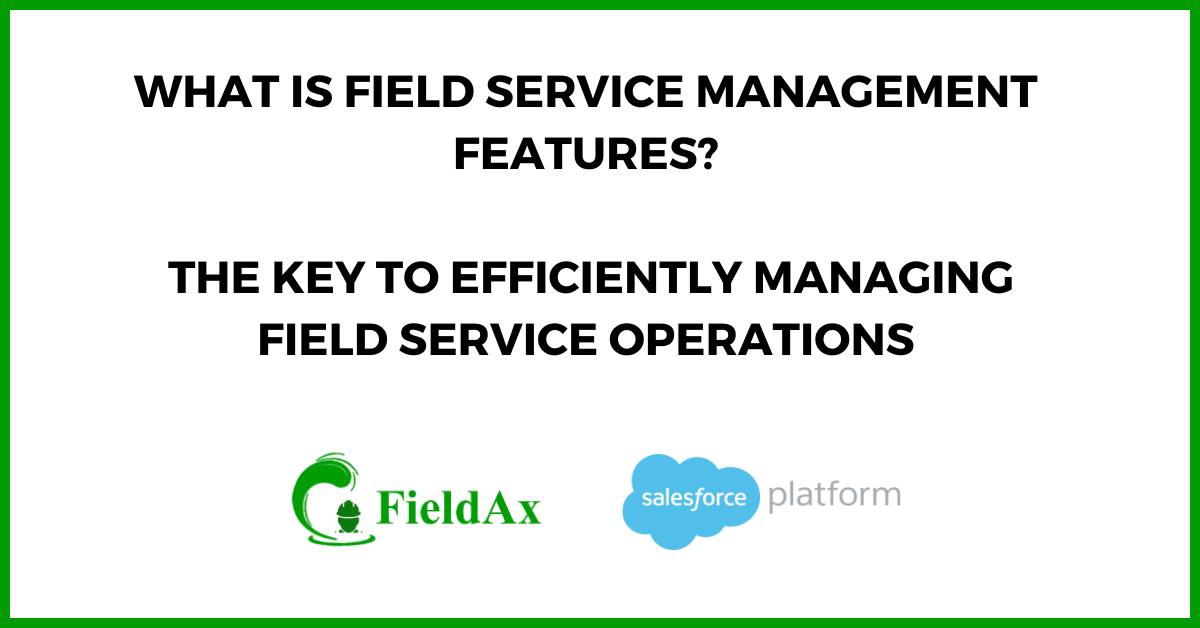Welcome to our educational guide on Field Service Management (FSM) features. In this article, we will delve into the world of FSM and explore its essential role in effectively managing field service operations for service-based organizations.
So, what exactly is Field Service Management (FSM)? FSM refers to the process and systems involved in managing and coordinating various aspects of field service operations. This includes managing mobile employees, optimizing equipment and resources, and ensuring seamless customer interactions.
FSM software plays a crucial role in supporting service-based organizations by providing a comprehensive set of features that streamline operations and enhance efficiency. With FSM software in place, businesses can:
- Effectively schedule and dispatch field technicians based on their skills and availability.
- Manage and track the assets and equipment required for field service tasks.
- Optimize routes and travel times to minimize travel costs and maximize productivity.
- Access real-time data and analytics to monitor field operations and make informed decisions.
- Improve customer interaction and satisfaction through automated updates, on-site digital tools, and streamlined communication channels.
In summary, FSM software empowers service-based organizations to efficiently manage their workforce, equipment, and customer interactions. By leveraging the right FSM features, businesses can enhance productivity, deliver exceptional customer service, and ultimately drive growth and success.

The Importance of Efficient Scheduling and Dispatching:
Effective scheduling and dispatching are essential components of field service management. Service organizations often face challenges when it comes to efficiently allocating tasks and dispatching field service personnel. Without the proper tools and processes in place, these challenges can lead to delayed service, increased costs, and dissatisfied customers.
Optimizing Scheduling Processes:
Field Service Management (FSM) software plays a crucial role in optimizing scheduling processes. By automating scheduling tasks, service organizations can create efficient routes and assign the right technician to the right job, considering factors such as proximity, expertise, and availability. This not only saves time but also improves resource utilization and reduces travel costs.
Ensuring Timely and Efficient Dispatching:
With advanced FSM software, service organizations can ensure timely and efficient dispatching of field service personnel. When a service request comes in, the software intelligently assigns the task to the most suitable technician and provides real-time updates. This level of automation and visibility improves response times and customer satisfaction while reducing the likelihood of errors or miscommunication during the dispatching process.
In conclusion, efficient scheduling and dispatching are vital for service organizations to deliver timely and high-quality field service. By leveraging FSM software, companies can optimize these processes, improve resource allocation, and enhance overall operational efficiency. In the next section, we will explore the importance of enhancing mobility and offline capabilities in field service management.
Enhancing Mobility and Offline Capabilities:
In today’s fast-paced world, mobility and offline capabilities are crucial for field service teams. With the increasing reliance on smartphones and tablets, it is essential for FSM software to offer mobile access and offline capabilities.
Enabling mobile access allows field service technicians to access crucial information while on the go. Whether they are visiting customer sites, conducting inspections, or performing repairs, having real-time access to data is essential for efficient operations.
Furthermore, offline capabilities are vital for field service teams working in areas with limited network connectivity. It ensures that technicians can still perform their tasks even in remote locations or areas with weak signal reception.
FSM software that offers offline capabilities allows technicians to download relevant data and access it offline, without the need for a stable internet connection. This ensures that they can complete their tasks without interruption, regardless of their location.
Having mobile access and offline capabilities offers several advantages for field service teams.
- Increased productivity: Technicians can access work orders, schedules, customer information, and other crucial details instantly, without having to rely on manual paperwork or calling back to the office, resulting in improved efficiency and productivity.
- Improved customer service: With real-time access to customer history, preferences, and service contracts, field service technicians can provide personalized and efficient service. They can also update job statuses, capture signatures, and generate invoices on the spot, enhancing the overall customer experience.
- Reduced downtime: When technicians have access to troubleshooting guides, equipment manuals, and knowledge bases offline, they can quickly diagnose and resolve issues, minimizing downtime and increasing first-time fix rates.
- Seamless data synchronization: FSM software with offline capabilities automatically syncs data once an internet connection is restored, ensuring that all updates and changes made offline are synced with the central system, eliminating the risk of data loss or discrepancies.
Streamlining Inventory and Asset Management :
In field service operations, managing inventory and assets can be quite complex. Keeping track of numerous parts, equipment, and tools across multiple locations can result in inefficiencies and increased downtime. However, with the help of Field Service Management (FSM) software, these challenges can be overcome.
FSM software provides a comprehensive solution for streamlining inventory and asset management. By centralizing inventory data and providing real-time visibility, it enables field service organizations to optimize their inventory control processes.
One of the key features of FSM software is its ability to track inventory levels and automate stock replenishment. This ensures that technicians always have the necessary parts and equipment on hand to complete service requests promptly.
Moreover, FSM software enables organizations to track and manage the entire lifecycle of their assets. It provides insights into asset utilization, maintenance schedules, and warranty information, allowing for proactive maintenance and minimizing costly breakdowns.
By streamlining inventory and asset management, FSM software improves overall operational efficiency. It reduces downtime by ensuring that technicians have the right tools at the right time, minimizing delays and service disruptions.
Additionally, FSM software can integrate with barcode scanners and mobile devices, enabling technicians to easily scan and update inventory information while in the field. This eliminates manual data entry and reduces the chances of errors, further enhancing efficiency.
In conclusion, FSM software plays a crucial role in streamlining inventory and asset management for field service organizations. By providing real-time visibility, automating stock replenishment, and optimizing asset maintenance, it enhances operational efficiency and reduces downtime.
Empowering Service Contract Management:
Managing various service contracts can be challenging for service organizations. With multiple contracts to track and ensure compliance, manual management processes can be cumbersome and prone to errors.
However, with the use of Field Service Management (FSM) software, service contract management can be automated, empowering service organizations with better visibility, compliance, and customer satisfaction.
- Better Visibility: FSM software provides a centralized platform to store and manage service contracts. This allows service organizations to easily access and view all contract details, including key milestones and renewal dates. The ability to have a comprehensive view of all contracts helps organizations stay on top of contract obligations and deliver timely and efficient service.
- Compliance: FSM software can automate contract renewals and ensure timely compliance with contract terms and conditions. By setting up automated reminders and notifications, service organizations can avoid missed renewal dates and potential penalties. Additionally, the software can generate reports to showcase compliance and track performance against contract obligations.
- Customer Satisfaction: Automated service contract management through FSM software enables prompt and efficient service delivery. With a centralized database of customer contracts, service organizations can easily access customer information, service history, and contract details. This helps service technicians better understand customer requirements and provides an opportunity for upselling or cross-selling additional services, ultimately improving overall customer satisfaction.
Enhancing Customer Experience through Self-Service Options:
Customers today have increasingly high expectations when it comes to self-service capabilities. They want quick and convenient solutions that allow them to manage their service requests efficiently. Field Service Management (FSM) software can help meet these expectations by providing a customer portal and self-service options.
With a customer portal, customers can log in and access a range of self-service features. They can submit service requests, track the status of their requests in real-time, and even schedule appointments based on their availability. This empowers customers to take control of their service experience and eliminates the need for constant back-and-forth communication with the service provider.
Furthermore, FSM software offers self-service options that allow customers to troubleshoot common issues and find solutions on their own. This can include an extensive knowledge base with FAQs, step-by-step guides, and instructional videos. By providing these resources, businesses can save time by reducing the number of support calls and enable customers to find the answers they need at their convenience.
By implementing self-service options through FSM software, businesses can enhance the overall customer experience. Customers no longer have to rely solely on customer support agents for every inquiry or issue. They have the power to find answers, schedule appointments, and manage their service requests on their own terms, ultimately leading to improved satisfaction and loyalty.
Analytics and Reporting Capabilities:
Unlocking the Power of Data in Field Service Management
In the realm of Field Service Management (FSM), analytics and reporting capabilities play a vital role in empowering organizations to make informed decisions. By harnessing the power of data, FSM software enables businesses to extract valuable insights that can drive improvements across various aspects of their operations.
Through sophisticated analytics tools and comprehensive reporting features, FSM software provides a wealth of information at your fingertips. From tracking key performance indicators (KPIs) to identifying trends and patterns, analytics and reporting empower organizations to understand their performance, identify areas for improvement, and make data-driven decisions.
One of the key advantages of analytics and reporting in FSM is the ability to gain real-time visibility into service operations. By monitoring and analyzing data in real-time, organizations can proactively identify and address issues, ensuring optimal customer service levels and maintaining operational efficiency.
Moreover, analytics and reporting features enable organizations to measure the effectiveness of various processes and strategies. With accurate and comprehensive data at hand, businesses can evaluate the success of their service delivery, identify bottlenecks, and optimize operations for maximum efficiency.
Another significant benefit of analytics and reporting in FSM is the ability to generate customizable reports. Organizations can generate reports tailored to their specific needs, highlighting the metrics and insights that matter most to them. These reports provide a holistic view of performance, allowing stakeholders to see the bigger picture and make informed decisions based on reliable data.
By leveraging cutting-edge analytics and reporting capabilities, organizations can drive continuous improvement in their field service operations. Armed with actionable insights, businesses can adapt strategies and processes, streamline operations, and optimize resource allocation.
With analytics and reporting features embedded in FSM software, organizations can transform raw data into valuable insights, enabling informed decision-making and paving the way for continued growth and success.
Key takeaways:
- Analytics and reporting provide valuable insights for organizations in field service management.
- FSM software enables data-driven decision-making through powerful analytics tools and comprehensive reporting features.
- Real-time visibility and measurement of effectiveness are key advantages of analytics and reporting in FSM.
- Customizable reports offer a holistic view of performance and facilitate informed decision-making.
- By leveraging analytics and reporting capabilities, organizations can drive continuous improvement in field service operations.
You are one click away from your customized FieldAx Demo!
Book Demo
Role-Based Permissions and Access Control:
Ensuring Data Security and Maintaining Operational Integrity
Role-based permissions and access control are crucial features in Field Service Management (FSM) software. With the increasing amount of sensitive data being handled by field service teams, it is essential to have robust security measures in place to protect this data and maintain operational integrity.
Granular Control Over Access and Permissions
FSM software allows administrators to assign specific roles to each team member, granting them access to relevant information and functionalities based on their job responsibilities. This granular control allows for a high level of security and ensures that employees only have access to the data and tools necessary for their work.
Data Privacy and Accountability
Implementing role-based permissions and access control provides an added layer of data privacy. It prevents unauthorized individuals from accessing sensitive information, reducing the risk of data breaches and misuse. Additionally, it enhances accountability within the organization, as each action performed within the FSM software can be traced back to the responsible user.
Overall, role-based permissions and access control play a vital role in protecting data, maintaining operational integrity, and ensuring compliance with data security regulations. By utilizing FSM software with these features, businesses can have peace of mind knowing that their information is secure and accessible only to authorized personnel.
Streamlining Invoicing and Billing Processes:
Invoicing and billing are crucial aspects of field service operations, but they can often be complex and challenging. Manual invoicing processes can be time-consuming and prone to errors, leading to delays in payment and dissatisfied customers. However, with the right Field Service Management (FSM) software, these processes can be automated, streamlining the invoicing and billing processes.
Automating Invoicing and Billing:
FSM software simplifies the invoicing and billing procedures by automating them. This automation reduces the reliance on manual data entry, minimizing errors and saving valuable time for field service teams. With FSM software, the invoicing and billing processes become more efficient and accurate.
Reducing Manual Errors:
Inaccurate invoices and billing statements can lead to disputes and delayed payments. FSM software eliminates the risk of human error and ensures that invoices are generated accurately based on the services provided. This reduces the likelihood of disputes and improves customer satisfaction.
Enhancing Accuracy:
FSM software enables the integration of service records, work orders, and customer data into the invoicing and billing processes. This integration enhances accuracy by ensuring that all relevant information is included in the invoices. It also eliminates the need for duplicate data entry, minimizing the chances of errors.
Improving Cash Flow Management:
Timely and accurate invoicing and billing processes are crucial for maintaining a healthy cash flow. With FSM software, invoices can be generated promptly, and billing statements can be sent to customers on time. This improves cash flow management for field service businesses, allowing them to receive payments faster and effectively manage their finances.
By streamlining the invoicing and billing processes, FSM software optimizes the financial operations of field service businesses. It ensures accuracy, reduces manual errors, and improves cash flow management, ultimately contributing to the overall efficiency and success of the organization.
Integration with Third-Party Applications and Systems:
Integrating your Field Service Management (FSM) software with third-party applications and systems can bring a multitude of benefits to your business. By seamlessly connecting your FSM software with other tools and platforms, you can enhance functionality, streamline data exchange, and ultimately improve overall productivity.
Enhanced Functionality:
Integrating FSM software with third-party applications allows you to expand the capabilities of your system. You can integrate with customer relationship management (CRM) software to access customer information, history, and preferences in real-time, enabling your team to provide personalized and efficient service. Additionally, integrating with communication tools like email and messaging platforms allows for smooth and instant communication between your field technicians and back-office staff, ensuring prompt updates and effective collaboration.
Seamless Data Exchange:
Integrating FSM software with other systems eliminates the need for manual data entry, saving time and reducing errors. For example, integration with inventory management systems enables real-time updates on stock levels, ensuring accurate tracking and efficient replenishment. Integration with accounting software streamlines the invoicing and billing processes, ensuring accurate financial records and timely payments. By automating data exchange, you can eliminate duplicate entries and maintain data integrity across your business systems.
Increased Productivity:
Integration with third-party applications and systems can greatly enhance your team’s productivity. For instance, integrating with project management tools allows you to seamlessly transfer work orders and project details, enabling your technicians to efficiently plan and execute their tasks. Integration with GPS navigation systems optimizes routes, minimizing travel time and maximizing service efficiency. With all the necessary information and tools at their fingertips, your technicians can provide faster and more effective service, ultimately increasing customer satisfaction.
By integrating your FSM software with third-party applications and systems, you can unlock a wealth of benefits that can propel your field service operations to new heights. From enhanced functionality to seamless data exchange and increased productivity, this integration can streamline your processes and empower your team to deliver exceptional service.
FAQ
1. What are the field service management features?
Field service management features are tools and functionalities that help businesses effectively manage their field service operations. These features typically include scheduling and dispatching, inventory and asset management, service contract management, customer experience enhancements, real-time tracking and GPS functionality, analytics and reporting capabilities, role-based permissions, and access control, invoicing and billing processes, building knowledge base and resource library, remote support and collaboration tools, optimizing routes and GPS navigation, and integration with third-party applications and systems.
2. How can field service management software help with efficient scheduling and dispatching?
Field service management software streamlines the scheduling and dispatching process by providing automated tools for assigning tasks to technicians based on their availability, skills, and geographical location. It helps businesses optimize their resources, decrease response times, and improve customer satisfaction by efficiently allocating and managing work orders.
3. What are the benefits of enhancing mobility and offline capabilities in field service management?
Enhancing mobility and offline capabilities in field service management allows technicians to access and update job information on the go, even without an internet connection. This enables them to stay productive and connected in remote or low connectivity areas, leading to faster job completion, improved communication, and better overall service delivery.
4. How does field service management streamline inventory and asset management?
Field service management software provides businesses with real-time visibility into their inventory and assets. It helps track stock levels, manage spare parts, and streamline replenishment processes. Asset management features allow businesses to track the location, status, and maintenance history of assets, improving utilization and reducing costs associated with lost or malfunctioning equipment.
5. What does service contract management entail in field service management?
Service contract management involves managing customer service contracts, including details of service agreements, warranties, and SLAs. Field service management software helps businesses effectively track and manage contract renewals, service level compliance, and customer entitlements. This ensures that service contracts are efficiently monitored and executed, leading to improved customer satisfaction and contractual compliance.
6. How can field service management enhance customer experience through self-service options?
Field service management software often provides self-service portals or apps that allow customers to conveniently request service, track the status of their requests, schedule appointments, or access relevant documentation. By empowering customers with self-service options, businesses can enhance customer satisfaction and reduce the need for unnecessary phone calls or manual interactions.
These FAQs cover some of the commonly asked questions related to field service management features. If you have more specific questions or need additional information, please feel free to reach out to us.
Conclusion
By understanding the various field service management (FSM) features, service-based organizations can greatly enhance their operations and achieve efficient field service management. Throughout this content, we have explored the importance of efficient scheduling and dispatching, enhancing mobility and offline capabilities, streamlining inventory and asset management, empowering service contract management, enhancing customer experience through self-service options, real-time tracking and GPS functionality, analytics and reporting capabilities, role-based permissions and access control, streamlining invoicing and billing processes, building a knowledge base and resource library, utilizing remote support and collaboration tools, optimizing routes and GPS navigation, and integrating with third-party applications and systems.
These features collectively contribute to improving productivity, reducing costs, enhancing customer satisfaction, and increasing revenue for service-based organizations. Investing in FSM software enables organizations to streamline their operations, eliminate manual errors, improve technician efficiency, and ensure prompt service delivery.
We encourage readers to explore each topic in further detail to gain a deeper understanding and make informed decisions about implementing FSM software. By taking advantage of the advanced features discussed, organizations can transform their field service management processes and gain a competitive edge in the market.
Author Bio
Co-Founder & CMO at Merfantz Technologies Pvt Ltd | Marketing Manager for FieldAx Field Service Software | Salesforce All-Star Ranger and Community Contributor | Salesforce Content Creation for Knowledge Sharing






